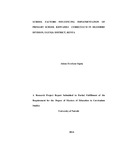| dc.description.abstract | The study was investigating the school factors influencing implementation of
primary school Kiswahili curriculum in Sigomere division in Ugunja District.
The study was guided by the following study objectives; teacher and learner
attitude towards Kiswahili subject, availability of instructional resources,
teacher preparedness and teaching methods. This study was guided by the
curriculum implementation theory propounded by Gross (1971).In this study
qualitative and quantitative method using descriptive survey research design
was used to collect data from sampled respondents. The study targeted all
teachers of Kiswahili, class seven pupils and the head teachers. A sample of
12 head teachers’, and 45 teachers and 260 class seven pupils of public
primary schools in Sigomere division in Ugunja District in Kenya was used. A
sample of 50% was arrived at by using stratified and simple random sampling
to sample the schools. Purposive sampling to sample head teachers and simple
random sampling was used to sample the teachers. A sample of 12 schools, 12
head teachers, 45 teachers of Kiswahili and 260 pupils was obtained for the
study. Data was collected using questionnaires, interview guides and
document analysis guide. The study findings established that implementation
of Kiswahili curriculum was influenced by attitude of the teachers and
learners, and inadequate in-servicing of teachers and to a large extent by the
selection of resources for teaching Kiswahili in schools. Not all the curriculum
support materials were selected from the recommended guide the ‘orange
book’. The study recommended that education office should ensure that all the
schools in the division should follow guidelines in the orange book when
purchasing the textbooks for their schools. Further the research recommends
that the government should ensure that schools have adequate instructional
resources in order to improve learner’s performance in Kiswahili. The study
will provides valuable information to stakeholders on the factors influencing
implementation of Kiswahili curriculum in public primary schools. The
findings from the study are important to policy makers on various methods
that can be employed to improve implementation of Kiswahili curriculum.
The study informs educational stakeholders on the school based factors
influencing implementation of Kiswahili curriculum. | en_US |

